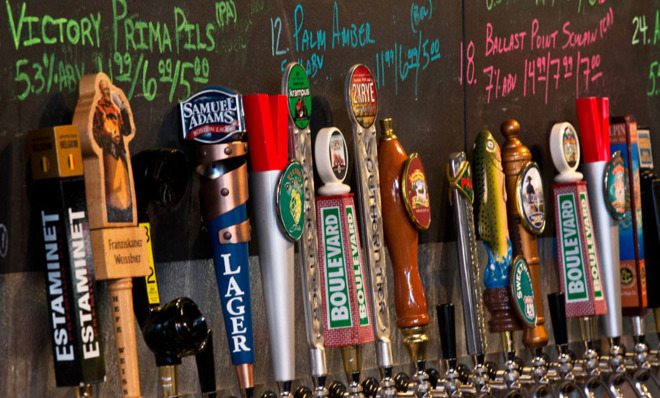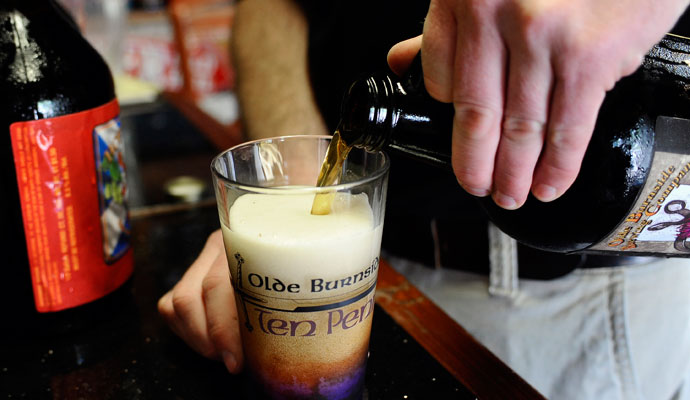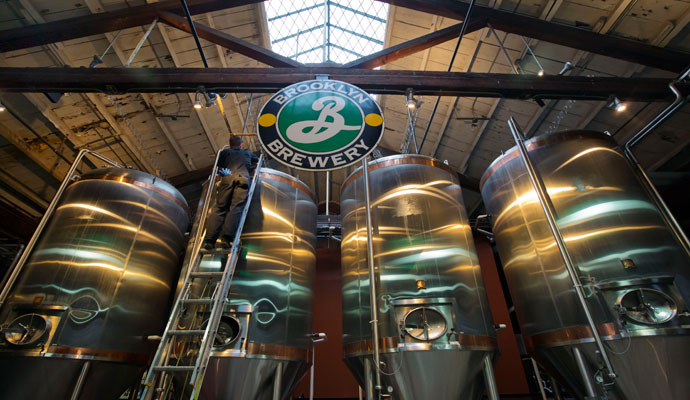Will a bunch of terrible craft beer ruin the booming craft beer industry?
There's a flood of new suds — and some of it sucks


A free daily email with the biggest news stories of the day – and the best features from TheWeek.com
You are now subscribed
Your newsletter sign-up was successful
In April, Brewers Association Director Paul Gatza issued a warning to the thousands of industry folks gathered at the annual Brewers Conference in Denver. Recalling a recent beer festival where he'd sampled offerings from about 10 new breweries, Gatza said seven or eight clearly needed improvement.
"We hate to see this segment being brought down with people having bad experiences in their glass when they're trying craft beer," he said.
Or to put it more bluntly, as he then did: "Don't f--k it up."
The Week
Escape your echo chamber. Get the facts behind the news, plus analysis from multiple perspectives.

Sign up for The Week's Free Newsletters
From our morning news briefing to a weekly Good News Newsletter, get the best of The Week delivered directly to your inbox.
From our morning news briefing to a weekly Good News Newsletter, get the best of The Week delivered directly to your inbox.
With the craft beer industry booming, quality control has emerged as a primary concern among brewers. Roughly 1,250 new breweries opened in the last five years, bringing the total to 2,822 nationwide. Yet not everyone who wants to make good beer knows how to make good beer, so the slew of fledgling ventures — all with varying levels of experience, knowledge, and skill — has led to some really bad brews hitting the market.
The industry prides itself on innovation and creativity, but those traits can be problematic when inexperienced brewers try to make difficult or unusual brews right from the start. And this mentality has led to some brewers rebelling against pale light lagers and racing to market with bold, though untested — and potentially gross — recipes.
"Remember how Picasso had to learn how to paint properly before he could do all those seemingly random paint splashes and make them work?" respected beer writer Pete Brown wrote last December. "You need to know how to brew boring brown ale well before you're qualified to mess around with more diverse stuff."
Hence, there are beers brewed with seaweed, Sriracha and beard yeast, among other odd ingredients. And though those beers may be perfectly fine — I've never tried them — many bad brewers have no idea their beer stinks.
A free daily email with the biggest news stories of the day – and the best features from TheWeek.com
"They just didn't know better," Gatza told The Week of the subpar breweries he'd sampled. Still, people are so eager to catch the craft wave that some are "jumping into the industry without a firm knowledge on beer quality."
Craft beer is a tantalizing business opportunity. Sales leapt 17.2 percent from 2012 to 2013, reaching $14.3 billion for the industry as a whole. And with established breweries flourishing as more newcomers opened shop, production roughly tripled in the past decade.
Yet that astronomical growth belies the challenges inherent in not just opening a brewery, but in making sure it stays open.
"You see some people who are starting breweries who say, 'You know what, I'm a really accomplished homebrewer. I've won some ribbons at the state fair. Why can't I run a production brewery?" Tom Whisenand, co-founder of Minneapolis' Indeed Brewing Company, told The Week.
Breweries are "extremely capital-intensive" and multifaceted, Whisenand adds, requiring not just brewing know-how, but business acumen. Though newbies to the industry are often experienced homebrewers, they may know zilch about marketing and finance, let alone how to transpose their stovetop brewing to commercial equipment.

"If your plan is that you, with no experience, are going to not only run the business but make the beer and you're going to do all of this really well, then it's just crazy," Whisenand says.
This is not a new phenomenon. The industry contracted in the late 1990s and early 2000s, in part because too many entrepreneurs entered the field assuming they could strike it rich without knowing — or worse, caring — enough about the product.
"People had dollar signs in their eyes," said Larry Bell, who founded the eponymous Bell's Brewery in 1983. "They didn't have the passion and time to build a brewery and a brand that was going to be sustainable."
These days, however, there are a plethora of cheap and accessible resources available to would-be brewers that can give them a leg up toward long-term viability. Several universities now offer courses in fermentation sciences and brewery management, and there are a few venerable schools dedicated solely to brewing, like the American Brewer's Guild, begun in 1997. Those educational opportunities, Gatza says, have become a "gateway" for brewers to enter the field far more prepared than their predecessors.
Homebrewing, an important steppingstone for most craft brewers, has also come miles since then. Even tiny homebrew shops now stock dozens of style-specific yeast strains and all the hardware necessary to convert a picnic cooler into an invaluable piece of brewing equipment.
And of course, the internet has given neophytes an inexhaustible wealth of tools and information, including websites that do all the hard math involved in recipe formulation, like instantly calculating the potential alcohol content and IBUs.
Those same resources have inculcated a new generation of better-informed beer drinkers, too.
"Fifteen years ago, you'd say the word 'IPA' to somebody and they wouldn't now what you were talking about," Gatza says. But today, "the beer drinker knows what's good and what's not in greater degree."
Heightened consumer knowledge can act as a double-edged sword though. Consumers are more liable to appreciate styles beyond the traditional pale lager — but they're also more attuned to spotting bad or spoiled beer.
It is incredibly difficult to brew flawless beer again and again. Even the best breweries aren't immune to botched batches and infections. But compared to the macro giants, craft brewers operate on thin profit margins that can serve as a disincentive to unimpeachable quality control.
"You take all this money to start the brewery, and shoot, you better start selling beer," Whisenand says. "So what if the beer that comes out of your fermenter is infected? You're going to have to encounter this decision-making where it's, 'Okay, I need to sell this beer to pay my bills, and to pay my investors, and to pay my loans."

The good news for craft brewers is fancy equipment to identify impurities — spectrophotometers, gas chromatographs — isn't as hard to come by as it once was. And given the industry's much-hyped camaraderie, established breweries are often willing to lend a hand to the new guys.
"I could say, 'Uh-oh, someone else is gonna open a brewery, they're gonna eat away at my market share," says Shane Welch, co-founder and President of Brooklyn's Sixpoint Brewery. "Or I could say, 'You know what, I'm making really good beer right now. If these guys come in and they make crappy beer, it's gonna hurt me because I don't have my sights set just on the tap handles I have now — I have my sights set on growing the entire industry's sales."
Barring an unlikely retread of prohibition, craft beer is likely to keep growing at a steady clip for now. The industry reported 18 percent growth in the first half of the year relative to the same period in 2013. And after a brief dalliance with other beverages, Americans are coming back around to beer as their boozy drink of choice.
Sure, there may be some contraction if regions get too saturated with craft breweries for everyone to compete. And certainly breweries making garbage water will be liable to fail, and fail hard. And that may sour some consumers on craft beer overall. But so long as craft brewers collectively don't "f--k it up," as Gatza put it, then the industry's overall health should remain bubbly into the near future.
"That's the whole point of this industry," Welch says, "and that's the only way it survives long term, and the only way it grows: That the beer stays high quality."
Jon Terbush is an associate editor at TheWeek.com covering politics, sports, and other things he finds interesting. He has previously written for Talking Points Memo, Raw Story, and Business Insider.
-
 Political cartoons for February 16
Political cartoons for February 16Cartoons Monday’s political cartoons include President's Day, a valentine from the Epstein files, and more
-
 Regent Hong Kong: a tranquil haven with a prime waterfront spot
Regent Hong Kong: a tranquil haven with a prime waterfront spotThe Week Recommends The trendy hotel recently underwent an extensive two-year revamp
-
 The problem with diagnosing profound autism
The problem with diagnosing profound autismThe Explainer Experts are reconsidering the idea of autism as a spectrum, which could impact diagnoses and policy making for the condition
